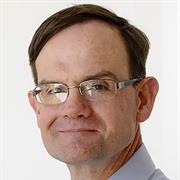

Animal Reproduction & Health Research
The Future
Advancing Reproductive Science for a Sustainable Future
At UCD Lyons Farm, animal reproduction research stands at the core of efforts to improve livestock fertility, productivity, and welfare in support of sustainable food systems. The UCD School of Agriculture and Food Science and the UCD School of Veterinary Medicine work together at Lyons to investigate the biological, genetic, and environmental factors influencing reproductive performance across species.
Researchers at Lyons Farm combine fundamental and applied studies ranging from cellular mechanisms of gamete and embryo development to reproductive management on commercial farms. This integrated approach provides new insights that benefit farmers, veterinarians, and the wider agri-food industry.
A Thriving Research Community
Over the years, UCD has fostered a vibrant and connected community of researchers and alumni who continue to advance reproductive science nationally and internationally. Many UCD graduates whose research was based at Lyons Farm play leading roles in universities, research institutes, and industry, forming an extensive network of partners that enriches ongoing discovery and application.
This collaborative spirit ensures a dynamic exchange of knowledge and innovation. Researchers and alumni regularly attend and present at leading international conferences such as the Society for the Study of Reproduction (SSR), the International Embryo Technology Society (IETS), the European Society for Domestic Animal Reproduction (ESDAR), the International Congress on Animal Reproduction (ICAR), the American Dairy Science Association (ADSA) the International Ruminant Reproduction Symposium (IRRS), the European Association for Animal Production (EAAP), amongst others. Their contributions keep UCD at the forefront of reproductive research, strengthening global collaborations and visibility.
The Future of Animal Reproduction Research at Lyons Farm
The future of animal reproduction research at Lyons Farm is defined by innovation and cross-disciplinary collaboration. As agriculture adapts to global challenges, including climate change, resource efficiency, and animal health, UCD is pioneering research that integrates reproductive biology, genetics, nutrition, and data science.
Emerging technologies such as genomic selection, precision breeding, reproductive biotechnologies, and advanced data analytics are transforming how fertility and herd performance are understood and managed. UCD Lyons Farm provides a unique platform where cutting-edge laboratory science meets practical on-farm application.
Through strategic partnerships with industry collaborators, government agencies, and international research centres, Lyons Farm will continue to translate scientific discovery into tangible solutions that improve the sustainability and profitability of livestock systems.
A new generation of researchers and alumni will carry this mission forward, ensuring that UCD remains a leader in reproductive science, shaping the future of farming both in Ireland and around the world.
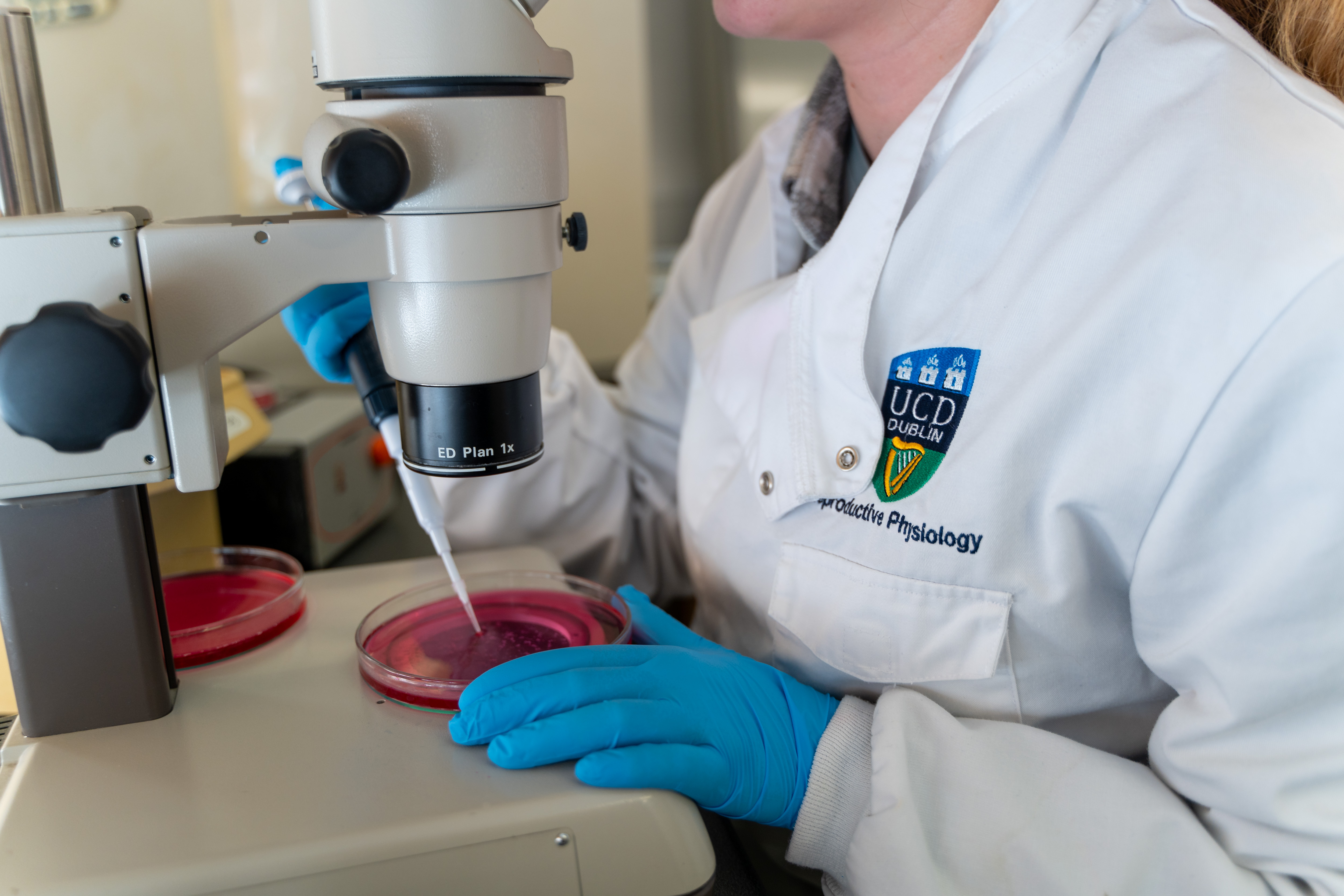
.jpg)
Research Legacy
Pioneer and Legacy: The History of Animal Reproduction Research and Teaching at UCD
The development of animal reproduction research and teaching at University College Dublin (UCD) is inextricably linked to the groundbreaking work and professional legacy of the late Professor Ian Gordon (1928-2021). Appointed in 1963, Professor Gordon, or 'Prof' as he was known, was a foundational figure whose career transformed the field, bringing both academic rigour and vital commercial application to livestock production. His profound contributions, particularly in oestrous synchronisation, superovulation, and embryo transfer, established a foundation of excellence at UCD that continues to influence the global industry.
Early Career and Foundational Research
Ian Gordon’s journey to becoming a pioneer was marked by dedication and a commitment to practical science. After gaining his Matriculation by private study, he graduated with a B.Sc. (Class 1) from Nottingham University in 1951. He further developed his expertise under the guidance of Sir John Hammond, widely considered the father of modern animal physiology, at Cambridge, where he earned a Diploma, M.A., and Ph.D. His philosophy was always that his research should have commercial application, a principle he applied throughout his career.
Much of his initial work focused on sheep reproduction, collaborating with farmers across England and Wales. He was instrumental in the control and manipulation of reproduction to enhance the efficiency of lamb production. This early work led to the development of a progesterone-PMSG procedure that became the basis of a commercially marketed kit. Following this, he applied his focus to gonadotrophin-induced twinning in cattle to increase reproductive efficiency, supported in part by the Milk Marketing Board. His international experience included two years in North America at Washington State University, where he worked on embryo transfer and twinning with E.S.E Hafez and E. Rajakoski.
Establishing UCD as a Centre of Excellence
In 1963, Professor Gordon joined UCD as a Senior Lecturer and was quickly promoted to Professor of Animal Husbandry. This appointment marked a turning point, with Professor Gordon channelling his energies into developing and refining controlled reproduction procedures for a range of farm animals, including sheep, cattle, pigs, and horses. His early studies at UCD focused on refining oestrus synchronisation in sheep, but his attention soon turned entirely to embryo transfer procedures in cattle.
The late sixties saw his focus shift to the technical frontiers of reproduction: in vitro maturation of oocytes and the hormonal induction of superovulation. A key innovation was his demonstration that the rabbit oviduct could serve as a short-term culture system for cow embryos before in vitro success was achievable. His most significant breakthrough for the industry was establishing a simple, non-surgical procedure for transferring embryos in the cow with high success rates. This transcervical procedure was almost universally adopted by the embryo transfer industry, demonstrating that normal pregnancy and high twinning rates could be achieved through simple means.
The Advent of Commercial In Vitro Production
In the mid-1980s, Professor Gordon pioneered the development of procedures for the large-scale in vitro production of bovine embryos as an alternative to superovulation. This research laid the foundation for commercial application, culminating in the establishment of Ovamass Ltd in 1987. This was the first company to commercialise the production of embryos in vitro, cementing Professor Gordon’s, and UCD’s, role as an incubator of industry-changing technology.
Beyond his research, Professor Gordon was an outstanding teacher and mentor, supervising approximately 80 full-time postgraduate research students (Masters and PhD) at UCD’s Lyons Farm. His deep, encyclopaedic knowledge and experience enriched the learning experience of his students. A prolific writer, he authored some 280 scientific articles and published six books after 1983, including the four-volume series Controlled Reproduction in Farm Animals and Laboratory Production of Cattle Embryos (first published 1994).
Professor Gordon’s profound impact was recognised by his peers, as he received the prestigious Pioneer Awards from both the Association of Embryo Technology in Europe (AETE, 1995) and the International Embryo Technology Society (IETS, 1998). His legacy is one of a true academic pioneer who steered UCD to the forefront of animal reproduction research, initiating many firsts for the industry and permanently advancing global knowledge.
Several of Professor Gordon’s graduates went on to have their own illustrious careers in animal reproduction.
Maurice Boland graduated from the then UCD Faculty of Agriculture in 1970 and immediately began a postgraduate research career under the supervision of Professor Gordon leading to a PhD in 1973. Much of his PhD was concerned with developing embryo transfer in sheep as a means of breed propagation. As a post-doc, Maurice worked extensively on embryo transfer in cattle and was one of the first to achieve success with non surgical embryo transfer techniques. The establishment of a simple non-surgical technique for transferring embryos in cattle led to the almost universal adoption of the technique by the embryo transfer industry as it was demonstrated that normal pregnancies and high twinning rates could be established using these simple transcervical procedures.
Over his career, Maurice's main areas of interest included 1) production and transfer of embryos produced both in vivo and in vitro, 2) factors affecting follicular growth and atresia in cattle and sheep, 3) fertility in the high fertility dairy cow, and 4) the link between nutrition and reproduction. In recognition of his contributions, Maurice was awarded the AETE Pioneer Award in 2011.
Within UCD, Maurice rose swiftly through the academic ranks from his appointment as College Lecturer from in 1976 to Chair and Professor of Animal Husbandry in 1994. During his career in UCD he served as Head of the Department of Animal Science and Production (1992-2001), Associate Dean for Research (2001-2004), Dean of the Faculty of Agri-Food and the Environment (2004-XXX). Following a major re-structuring exercise in the University in 2005, he then became the Head of the new School of Agriculture, Food Science and Veterinary Medicine and in 2008, was appointed as Principal, College of Life Sciences.
During his research career Maurice worked extensively with Professor Jim Roche, also a graduate of the Faculty of Agriculture, who went on to spend his career as Professor of Animal Husbandry in the then Faculty of Veterinary Medicine. Professor Roche was a pioneer of our understanding of follicle development and turnover in cattle and together with successive postgraduate students they published numerous key landmark papers on follicle turnover and postpartum follicular dynamics in cattle.
Jim graduated from UCD with a B.Agr.Sc. Degree in 1965. He pursued a postgraduate research career under the supervision of Professor Gordon, obtaining a M.Agr.Sc. Degree in 1966. He then went to the University of Illinois to complete a Ph.D. under the supervision of Phil Dzuik. Much of his Ph.D. was concerned with LH secretion in ewes in different physiological states. Jim returned to Ireland to a 2-year post doc position in the Agricultural Institute (now Teagasc) at Dunsinea, Dublin, following which he was appointed a Senior and, subsequently, Principal Research Officer with the Agricultural Institute Animal Management Department in Dunsany, Co. Meath. While with the Agricultural Institute, Jim commenced working on the use of prostaglandin and progesterone for synchronisation of oestrus in cattle; indeed, it was he who developed the early PRID coil device for progesterone synchronisation. He also developed an interest in studying follicle dynamics in cattle and in collaboration with Jim Ireland (Michigan State University), developed the dominant follicle hypothesis in cattle based on follicular dynamics through the oestrous cycle.
In 1980, Jim joined the UCD Faculty of Veterinary Medicine in 1981 as Professor and Head of Department of Animal Husbandry and Production. In UCD, Jim continued his illustrious scientific career focusing on follicle dynamics and oestrous synchronisation in cattle, reproductive seasonality in sheep while also dabbling in mare and pig reproduction and aspects of sperm preservation in sheep and horses. He led a very active research team in reproductive biology alongside his colleague Maurice Boland in the then UCD Faculty of Agriculture to bring about substantial disruptive changes in the areas of bovine follicle dynamics, oestrous synchronisation and embryo transfer.
From 2000 to 2002 Jim took on the significant role as Director of Research for Teagasc. He returned to the Faculty of Veterinary Medicine in 2002 as Professor of Animal Husbandry and Production where he became Director of Research in the newly combined School of Agriculture, Food Science and Veterinary Medicine from 2005 until his retirement in 2008.
In recognition of their individual and joint achievements, both Maurice and Jim were awarded the Pioneer Award at the 11th International Ruminant Reproduction Symposium held in Galway in May 2023.
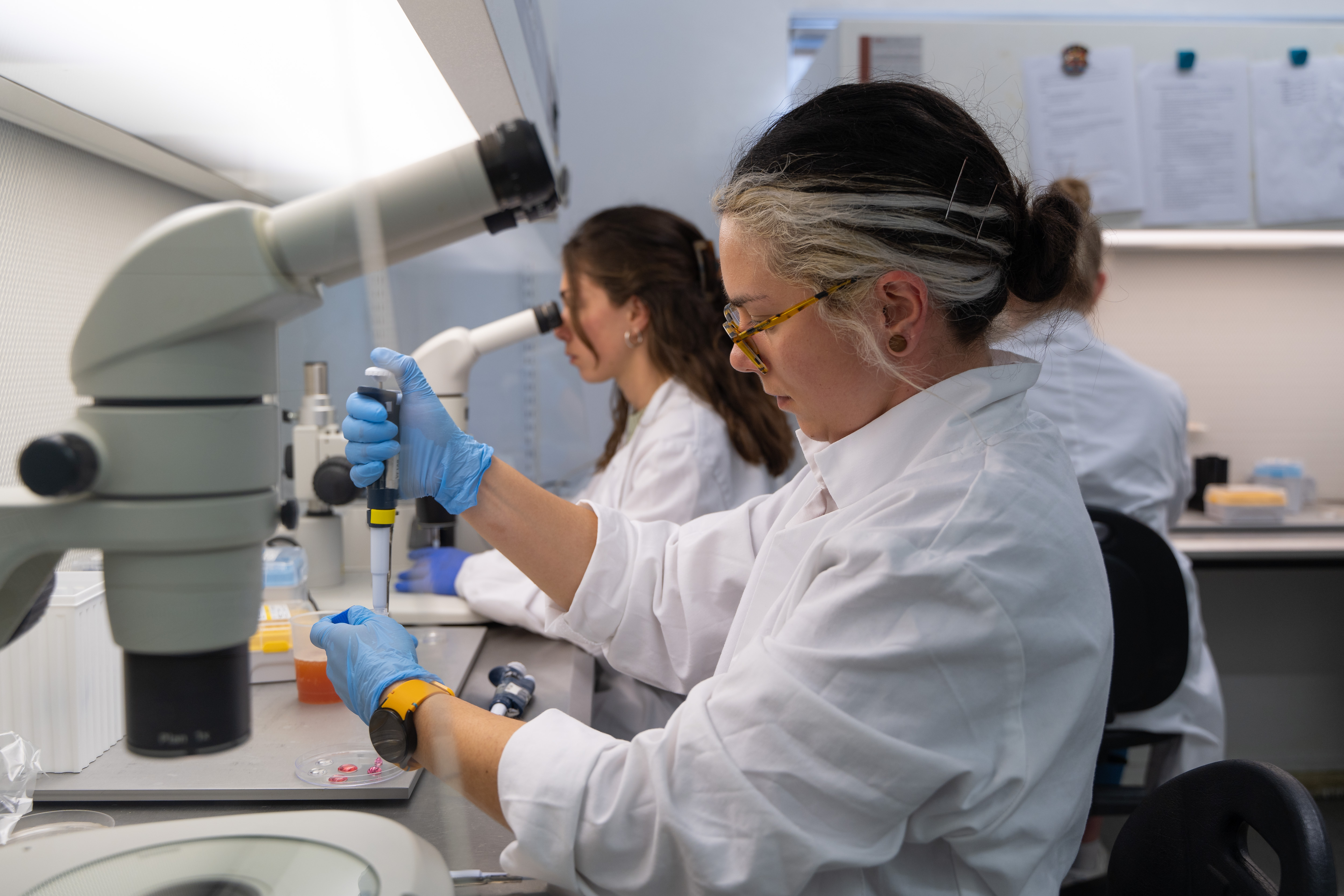
The Challenge
The challenge of fertility: Reproduction is a fundamental process in biology, ensuring the continuity of life and fertility, the capacity to produce offspring is central to the health of the Animal Kingdom, regardless of species. The inability to reproduce, defined as infertility (or subfertility, in less severe cases) impacts both livestock species and humans.* In livestock, subfertility or poor reproductive efficiency, leads to economic losses and impedes environmental sustainability. Fertility is also central to preserving biodiversity in farm animals, through the maintenance of indigenous breeds, and wild species threatened by extinction, where low numbers of individual animals, their disease status and advanced age limit natural conception. Female fertility is affected by a variety of factors. Health conditions like endometriosis, endometritis, oviduct/uterine and ovulation disorders, and abnormal semen parameters, are known causes of infertility. In some cases infertility has been linked to adverse environmental conditions. Climate, radiation, air pollutants, nutrition, toxic substances, and endocrine-disrupting chemicals have been identified as key environmental factors impacting female fertility.
*In humans, the World Health Organization (WHO) defines infertility as a pathology marked by no conception after one year of regular intercourse. In 2023, WHO reported that 17.5% of adults worldwide face infertility (16.5% in Europe)(opens in a new window)[1]. Additionally, Eurostat data show that 2022 births in the EU were nearly half of what they were six decades ago(opens in a new window)[2]. Other than a demographic and economic impact, infertility has negative social impacts on couples.
Research Focus
Current reproduction research at Lyons explores
- The trajectory of oocyte development and the factors that impact on ovarian function
- The effect of micro and nanoplastics on gamete biology and fertility
- Factors affecting successful early embryo development
- Maternal embryo communication during pregnancy establishment
- The application of assisted reproductive technologies (ARTs) to domestic animals
- Causes of pregnancy loss
The oocyte, or female gamete, is fundamental to sexual reproduction in mammals, playing a central role in the health and survival of offspring. In mammals, oocytes develop within the ovarian follicle, and upon fertilisation, they provide the molecular foundation for early embryo development. Oocyte quality is defined as the oocyte’s ability to generate viable embryos, thus it is critical to both natural conception and assisted reproductive technologies (ART).
Environmental threats
Climate change: The most significant direct impact of climate change on livestock production comes from heat stress, which reduces livestock productivity and animal health. Heat stress compromises oocyte growth and quality in cows, by altering hormonal and ovarian dynamics during the oestrous cycle, resulting in drops of up to 30% in conception rates of dairy cows in summer. This problem is not limited to animals near ovulation but also affects follicles and oocytes at early developmental stages, with lasting effects even after the hot season. Furthermore, heat stress during gestation, particularly in the second and third trimesters, can adversely affect the fertility of future generations by damaging the formation of ovarian follicles in the developing foetus.
Nutrition: Projected rising global temperatures have the potential to deleteriously impact forage production, which will have major consequences for human and animal nutrition. Inadequate nutrition delays puberty and sexual maturity in heifers and resumption of ovarian activity and oestrus in postpartum cows. Under nutrition detrimentally affects oocyte quality. Paradoxically, over-nutrition is also a major concern in Europe and North America, where obesity is an increasingly prevalent human health burden. Obesity impairs fertility through an effect upon the mechanisms regulating oocyte development, ovulation, embryo development, uterine function, implantation and pregnancy loss.
Contaminants: Micro and nanoplastics (MNPs) represent another growing environmental threat to reproductive health. MNPs, which result from the breakdown of larger plastics or from synthetic production, are pervasive in the environment and have been detected in both human and animal tissues. In particular, MNPs have been shown to disrupt oocyte function, including inhibiting meiosis and impairing protein expression vital for oocyte maturation. Studies have found MNPs in the follicular fluid of both humans and cows, suggesting that these pollutants can permeate reproductive tissues and compromise fertility. The potential reproductive harm from MNPs is gaining international attention, the UN Environment Program (UNEP, 2022) recently issued a statement warning that plastic leaking into fields may endanger food security(opens in a new window)[3].
Assisted reproductive technologies
Several generations of assisted reproductive technologies (ARTs) have been applied to livestock breeding. ARTs such as artificial insemination (AI), multiple ovulation embryo transfer (MOET), in vitro embryo production (IVP), regulation of the timing oestrus and ovulation to facilitate timed AI and timed embryo transfer, and sex-sorting of sperm to produce offspring of the desired sex are already well established in the toolbox accessible to farmers. These ARTs are employed to overcome infertility, enhance reproductive efficiency in livestock and help in the conservation of endangered breeds/species. Unfortunately, the efficiency of oocyte-based ART remains relatively low, with only about 20% of oocytes resulting in a live birth. Much research is focused on improving the efficiency of ARTs and also expanding them to include oocyte and ovarian cortex cryopreservation, techniques which involve extensive oocyte or follicle culture in vitro and are associated with low rates of embryo development. In vitro follicle culture (IVFC), recapitulates in vivo oocyte and follicle growth and development. While IVFC systems have been successfully developed in laboratory mice, progress in livestock species like cattle has been slower due to challenges like slower follicle growth and difficulties in isolating follicles. Given the potential long-term and transgenerational effects of environmental stressors, the IVFC system holds promise not only for advancing assisted reproduction but also as a valuable research tool to help study environmental influences on fertility and develop strategies for preserving oocyte quality in the face of growing environmental challenges.
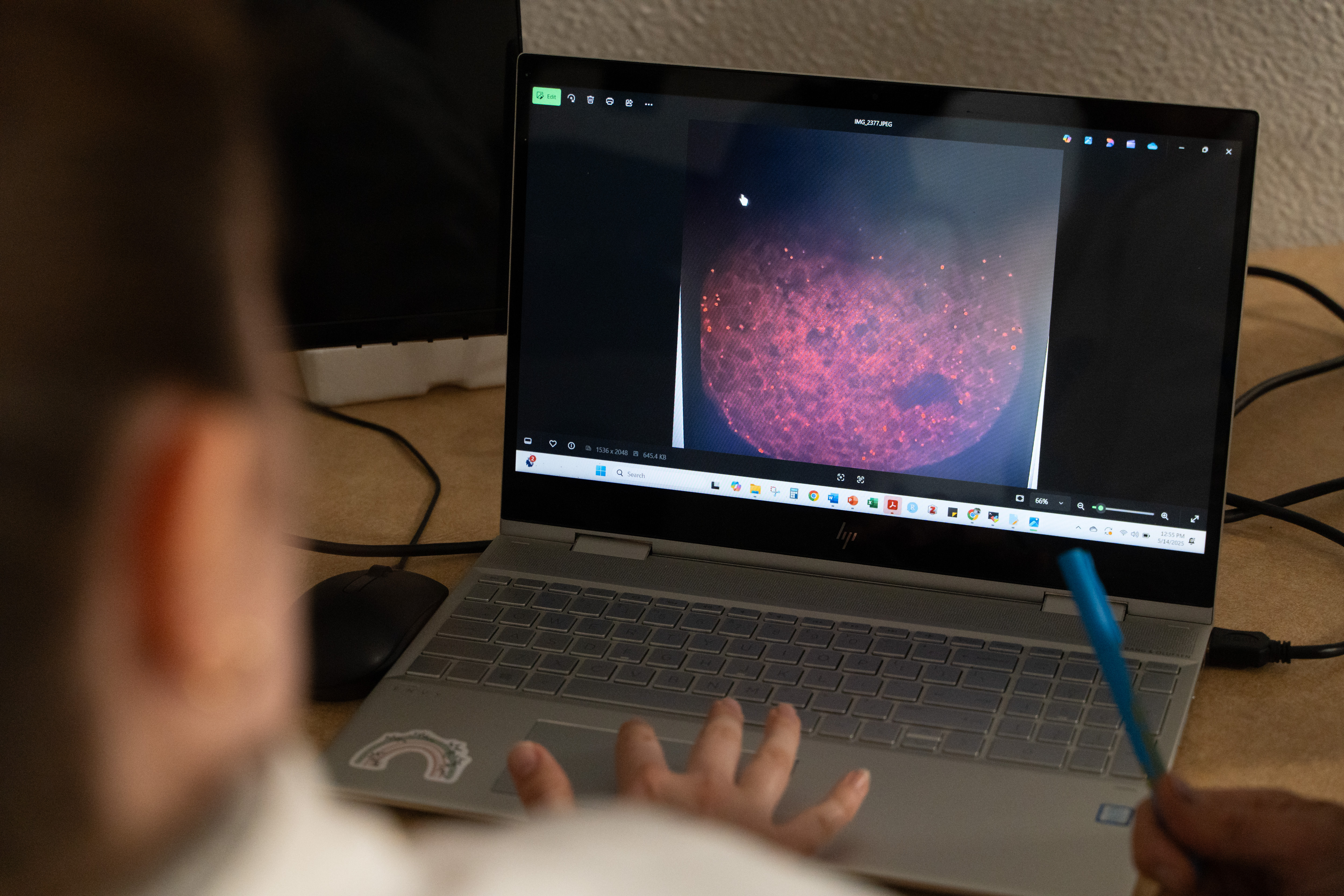
Research Projects
Research Project : Environmental Contaminants and Occyte and Folicle Development
Project Name: Fertility under threat in evermore challenging environments
Principal Investigator: Trudee Fair UCD, Ireland & Anna Denicol UC Davis, USA
Research Statement:
Environmental stressors generated by human activity such as heat stress (magnified by global warming) and microplastics (accumulation of plastic derivatives in the environment) impair reproductive fitness by affecting ovarian function. Funded under the Zoetis UCD2 OneHealth Award, this collaborative research project hypothesises that environmental stressors cause abnormal ovarian oocyte and granulosa cell function, reducing competence for development. The molecular consequences of heat stress and micro and nanoplastic particles (MNP) on oocyte and follicle quality, epigenetic status and competence for development are investigated using a bovine in vitro follicle culture system developed by Prof Denicol and now established in UCD-Lyons.
Research Links:
This project links in with a recently successful UCD seed funding application lead by Assoc Prof Junli Xu in School of Biosystems and Food Engineering, which brings together several UCD academics to address the role of farm animals as a potential bridge between environmental contamination and human health impacts. Specifically, we will investigate livestock as reservoirs and carriers of micro- and nanoplastic (MNP) contamination along the food chain, to enable a more complete exposure assessment and subsequent hazard evaluation.
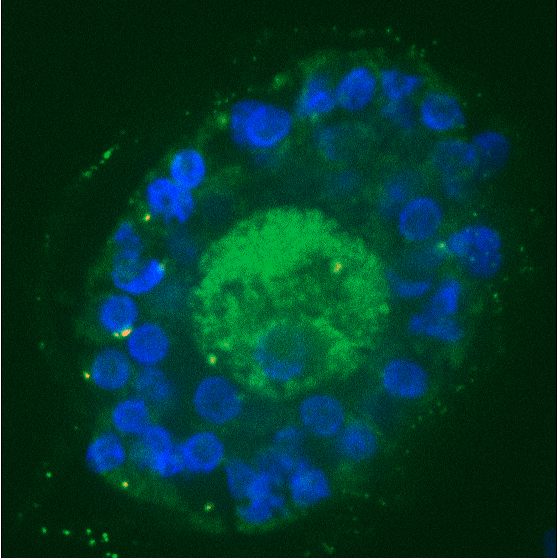
Pic: Confocal laser scanning micrograph of a bovine primordial follicle following in vitro culture with green fluorescent labelled 100 nm polystyrene beads.
Research Project : Oocyte Growth & Follicle Development (EUROVA)
Project Name: European Oocyte Biology Research Innovative Training Network (EUROVA)
Principal Investigator: Coordinated by Professor Trudee Fair UCD, funded by the European Commission under the Marie Skłodowska Curie actions (2020-2024)
Research Statement
The oocyte plays a pivotal role in fertility. While advances in biotechnology have generated a vast amount of information on the molecular composition of mammalian oocytes, knowledge of the molecular mechanisms leading to oocyte acquisition of developmental competence is fragmented: The EUROVA Oocyte Biology Training Network, was established to build critical mass in European oocyte biology research by training 15 Early Stage Researchers; three of whom were registered PhD students in UCD: Their projects included characterising the transcriptomic and methylomic profile ((opens in a new window)Latorraca et al., 2024; (opens in a new window)Latorraca et al., 2025) and nuclear progesterone receptor protein expression in growing and preovulatory bovine oocytes ((opens in a new window)D’Augero et al., 2025) and identifying the impact of aging on protein expression in human oocytes (opens in a new window)(Galatidou et al., 2024).
Research Links
- (opens in a new window)https://pubmed.ncbi.nlm.nih.gov/38580918/
- (opens in a new window)https://pubmed.ncbi.nlm.nih.gov/40549556/
- (opens in a new window)https://pubmed.ncbi.nlm.nih.gov/38870523/
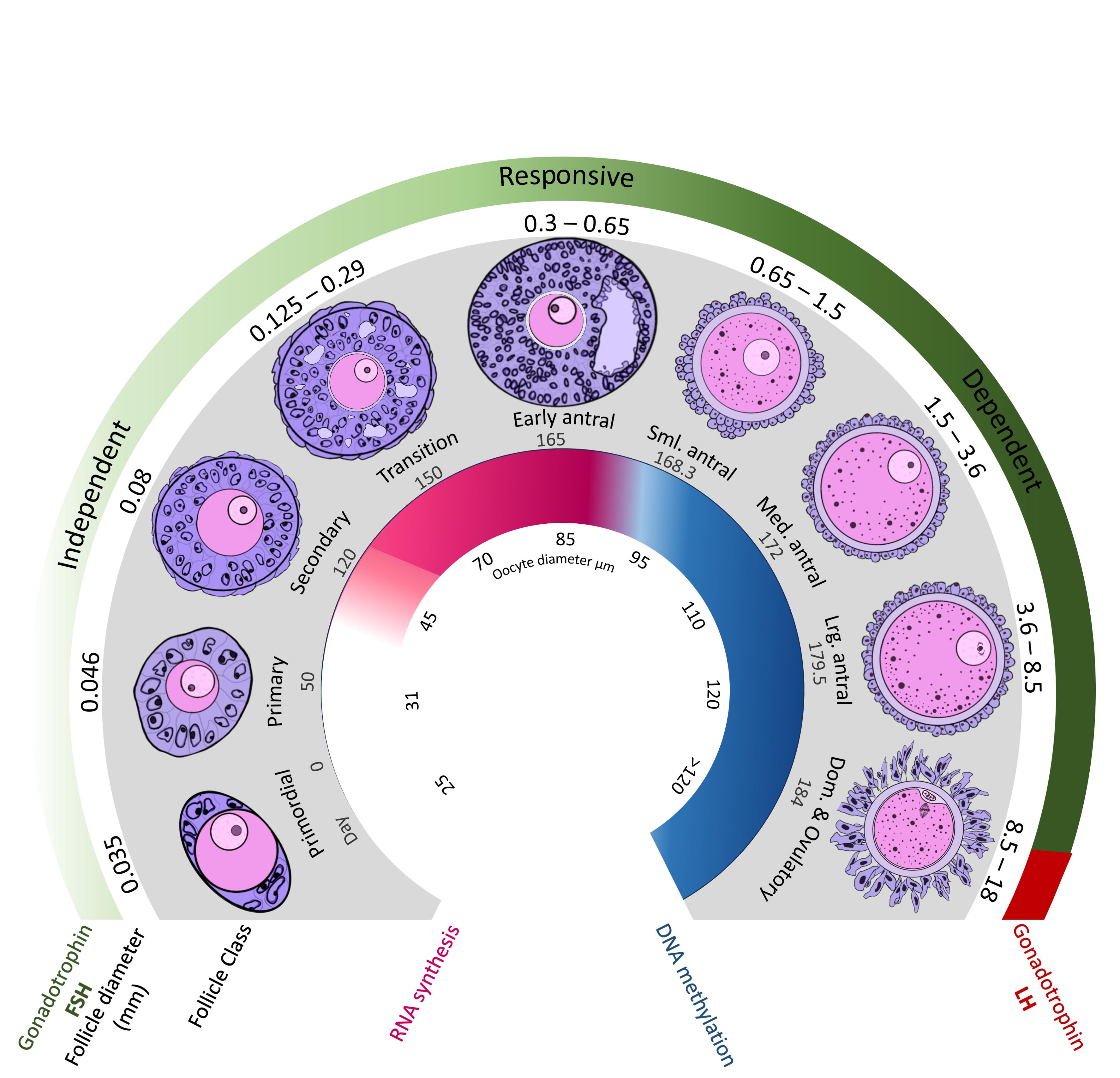
Pic: Schematic diagram depicting oocyte growth and follicle classification in cattle. (opens in a new window)Fair and Lonergan (2023)
Research Project : Contribution of the immune system to ovulation
Project Name: Immunological aspects of ovarian follicle ovulation and corpus luteum formation in cattle
Principal Investigators: Dr. Noof Abdulrahman Al Rabiah, supervised by Trudee Fair UCD, funded by the Saudi Arabian Culture Bureau.
Research Statement
This PhD project explored how the innate immune system drives the transition from the preovulatory follicle to the corpus luteum in cattle. Ovulation was shown to involve a transient sterile inflammatory response, beginning with neutrophil influx around the LH surge, followed by macrophage and dendritic cell expansion. Inflammation resolution and corpus luteum formation depend on coordinated expression of inflammatory and anti-inflammatory cytokines such as VEGFA, MMP9, and TIMP1. Global metabolomic profiling identified over 600 metabolites in peri-ovulatory follicular fluid, with significant changes in the 24 hours before ovulation. Elevated tryptophan, BCAAs, and sphingomyelins indicated immune modulation, while xenobiotic metabolites suggested detoxification roles; nucleotide depletion reflected oocyte maturation. Spatio-temporal miRNA analysis implicated miR-155 and miR-142 in dendritic cell regulation. Under normal physiological conditions, ovulation is a precisely controlled sterile inflammatory process that resolves rapidly to support corpus luteum development, further work will determine the impact of disease/health, metabolic and nutritional status on such a finely orchestrated process.
Research Links
- (opens in a new window)https://pubmed.ncbi.nlm.nih.gov/41050209/
- (opens in a new window)https://pubmed.ncbi.nlm.nih.gov/36547396/
- (opens in a new window)https://pubmed.ncbi.nlm.nih.gov/34255737/
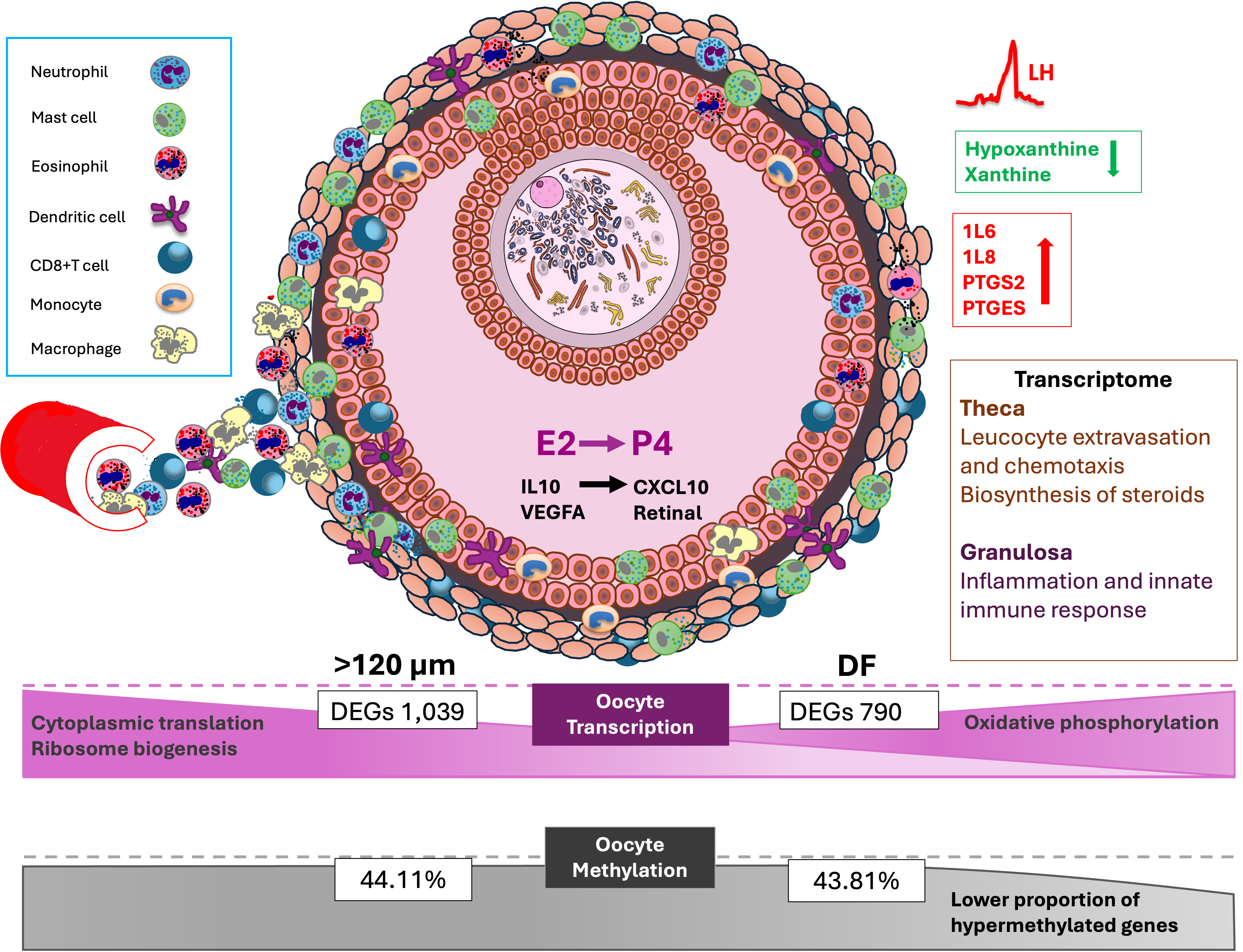
Pic: Summary diagram synthesizing the key changes in the microenvironment of the Dominant/Preovulatory follicle. (opens in a new window)Latorraca et al., 2025.
Project Name: AFRODITA - Advancing Fertility and Reproduction through Dedicated and Innovative Technological Applications
Principal Investigator: Professor Pat Lonergan and Professor Trudee Fair
Research Statement
AFRODITA is a Marie-Skłodowska Curie Action (MSCA) Doctoral Network (DN) funded by the European Commission under the Horizon Europe programme designed to train a new generation of excellent researchers through a Joint Doctorate programme aimed at Advancing Fertility and Reproduction through Dedicated and Innovative Technological Applications.
The consortium comprises 9 beneficiary institutions, including UCD, and 8 associated partners. It brings together key scientific staff from the academia (5 European universities and 3 research centres), one hospital and the corporate world (8 enterprises). The University of Murcia (Spain) coordinates the action and the 17 participating institutions are distributed across 9 countries: Spain, France, Ireland, Belgium, Denmark, Netherlands, Italy and the USA.
The AFRODITA aims to study assisted reproductive technology (ART)-derived effects on the health of offspring, the underlying mechanisms and their consequences and to propose comprehensive solutions. AFRODITA will train 15 doctoral candidates, two of which are based at UCD Lyons.
For more information see: (opens in a new window)https://portales.um.es/web/afrodita
Project Name: BULLNET - A cutting-edge integrated approach to sperm biology and associated reproductive biotechnologies to assist the dairy and beef industries meet growing societal, environmental and economic demands
Principal Investigator: Professor Pat Lonergan
Research Statement
BullNet is a Marie Curie Doctoral Training Network focused on understanding and improving bull fertility funded by the European Union’s Horizon Europe programme under the MSCA Doctoral Network. It comprises a multi-disciplinary and inter-sectorial research programme designed to unravel the complex underlying biology of compromised fertility of individual bulls. Cutting-edge basic, applied and machine-learning approaches will be used to understand the biological regulation of sperm function and testis biology in order to optimise fertility. It will train 14 PhD students (Doctoral Candidates) in a diverse range of disciplines while addressing key industry relevant research questions. One DC is based at UCD Lyons.
For more information see: (opens in a new window)https://www.ul.ie/research/bullnet-research
Project Name: IMPLANTEU - Innovative approaches to implantation research in health and disease
Principal Investigator: Professor Pat Lonergan
Research Statement
IMPLANTEU is a European doctoral network dedicated to advancing embryo implantation research through cutting-edge science, interdisciplinary collaboration, and innovative training programs. Our mission is to bridge basic, clinical, and applied research to improve reproductive health and agricultural sustainability. IMPLANTEU unites 11 beneficiaries, including UCD, and several associated partners from 9 European countries, forming a network of world-class researchers and institutions committed to excellence in reproductive medicine, stem cell biology, biotechnology, veterinary science, and bioethics. IMPLANTEU provides highly specialized training to 13 Doctoral Candidates (DCs), equipping them with the skills to address major challenges in embryo implantation. One DC is based at UCD Lyons.
For more information see: (opens in a new window)https://www.implanteu.eu
Project Name: DAIRYBEEF - Accelerating genetic gain and improving beef output from dairy herds
Principal Investigator: Professor Pat Lonergan
Research Statement
The aim of this collaborative project between UCD and Teagasc is to apply Assisted Reproductive Technologies (in vitro fertilisation, sex-sorted semen, embryo transfer) to accelerate genetic gain for milk and beef production, and transform the dairy herd calf crop to a combination of high genetic merit dairy female calves and premium quality beef calves. This structural change takes advantage of new tools that are now available for animal breeding and will help to increase the efficiency of dairy and beef production. Three UCD registered PhD students are working on this project.
Research links:
- (opens in a new window)https://pubmed.ncbi.nlm.nih.gov/34538485/
- (opens in a new window)https://pubmed.ncbi.nlm.nih.gov/37567682/
- (opens in a new window)https://pubmed.ncbi.nlm.nih.gov/37806631/
- (opens in a new window)https://pubmed.ncbi.nlm.nih.gov/39343229/
- (opens in a new window)https://pubmed.ncbi.nlm.nih.gov/40043771/
- (opens in a new window)https://pubmed.ncbi.nlm.nih.gov/40706861/
- (opens in a new window)https://pubmed.ncbi.nlm.nih.gov/40720734/
- (opens in a new window)https://pubmed.ncbi.nlm.nih.gov/40885305/
- (opens in a new window)https://pubmed.ncbi.nlm.nih.gov/41050207/
- (opens in a new window)https://pubmed.ncbi.nlm.nih.gov/41186200/
Project Name: HETEROBULL - Developing semen technology to improve the sustainability of the national herd
Principal Investigator: Professor Pat Lonergan
Research Statement
Heterospermic semen (HS) involves the mixing of semen from two or more bulls in a single semen straw. Due to a change in EU legislation in 2021 (Regulation (EU) 2016/429), bovine HS is now marketed in Ireland. A highly experienced academic and industry team (University of Limerick, UCD, Teagasc, ICBF), backed-up by international leaders in bull fertility, will provide sound scientific evidence on the impact of HS on fertility and to explore the molecular mechanisms underpinning this impact. Our vision is increased AI usage, including that of sex-sorted sperm (homospermic or HS), in the first three weeks of the breeding season followed by high genetic merit beef HS for the remainder, so as to improve the quality of beef from the dairy herd, reduce the age to slaughter and contribute to a reduction in emissions, while improving animal welfare. One PhD student is based at UCD Lyons.
Research Project : Impact of Postpartem infection and inflammation on cow fertility.
Project Name: Control of metabolic, inflammatory and metagenomic dysregulations that impair fertility in dairy cows
Principal Investigator: Dr. Osvaldo Pascottini
Research Statement
Following calving, the bovine uterus undergoes profound morphological and microbiological changes before regaining receptivity for a new pregnancy. The recovery of tissue damaged during from placental separation depends on the severity of trauma at parturition, metabolic stress and immune competence. Successful uterine involution involves controlled inflammation and requires a balanced microbiota, yet almost 50% of cows develop persistent endometrial inflammation—classified as clinical endometritis (CE) when purulent discharge is present or subclinical endometritis (SE) when it is absent. Clinical endometritis results from bacterial infection, while SE often reflects impaired immunity. These conditions delay ovarian cyclicity, decrease conception rates and reduce cow longevity within the herd. Despite advances in understanding uterine diseases, practical field applications remain limited, underscoring the need for diagnostic models linking uterine health with productivity and fertility outcomes.
Research Links
International Collaboration
Collaboration and the exchange of information are fundamental to advancing animal and human reproductive science. Through strategic partnerships, UCD researchers engage with leading institutions and industry partners worldwide to accelerate discovery, share resources, and enhance research quality. These collaborations are maintained through international grants, joint projects, regular communication, and active participation in conferences and consortia. At UCD Lyons Farm, such networks create a strong, multidisciplinary community where collective expertise drives progress in fertility, assisted reproductive technologies, livestock efficiency, and species conservation. All ensuring that research outcomes deliver meaningful global impact.
.png)
Our Team

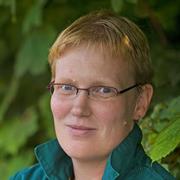
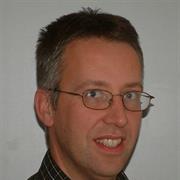
.jpg)
.ie_403149.jpg)
Our Alumni
The UCD Lyons Farm alumni form a dynamic Community of Practice, linking former researchers and PhD graduates from the School of Agriculture and Food Science and the School of Veterinary Medicine who have gone on to become leaders in reproductive science and related fields. This growing network benefits from a strong knowledge base, supported by grant-funded research and interdisciplinary collaborations. Lyons Farm, as a hub of innovation and research excellence, continues to develop its facilities, with planned capital investment signaling both the strength of practice here and the growing need for advanced research infrastructure. Alumni engagement fosters mentorship, knowledge exchange, and a lasting global impact.
Meet some of our Alumni of note
(opens in a new window)Lais Barbosa Latorraca
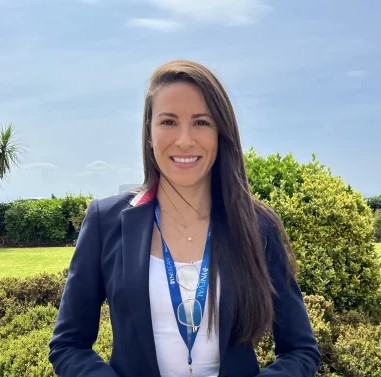
Senior Researcher at CRV B.V. Research & Development Global Genetics Department (CRV, LATORACCA) in the Netherlands.
Lais Barbosa Latorraca, is veterinarian and researcher driven by curiosity about oocyte biology and fertility. Her academic journey began in Brazil and took her across countries from São Paulo State University to Colorado State University to University College Dublin, where she completed her PhD in Reproductive Physiology as part of the EUROVA Marie Skłodowska-Curie network. During her time at UCD Lyons Research Farm, in the Animal Reproduction Lab, I explored the genomic and transcriptomic mechanisms of bovine oocyte development. Today, as a Senior Researcher at CRV B.V. in the Netherlands, Lais is able to apply my research knowledge to enhance cattle breeding efficiency, especially on in vitro embryo production from Holstein donors.
(opens in a new window)Lydia O’Hara
(Holles Street Hospital IVF) Embryologist Merrion Fertility Clinic Ireland.
(opens in a new window)Federico Randi
-382x574.jpeg)
(Ceva Animal Health, Pre-natal Ruminant, Repro Specialist) Global Technical Manager, Ruminants Corporate Marketing
Dr. Federico Randi is the Global Technical Manager for Ruminants at Ceva Animal Health. His professional career has been dedicated to advancing cattle reproduction.
He earned his Doctor of Veterinary Medicine degree summa cum laude from the University of Bologna, Italy. He then pursued a PhD at University College Dublin, Ireland, as part of a collaborative project between UCD and Teagasc under the supervision of Professor Patrick Lonergan.
His doctoral research focused on reproductive biology in cattle, with particular emphasis on fixed-time artificial insemination in the dairy and beef industries. During this time, he contributed to the development of sensor technology for ear temperature monitoring as an estrus detection system and investigated the role of synchrony between the maternal uterine environment and embryonic development in successful pregnancy establishment.
Dr. Randi served as Industry Representative on the Scientific Commission of Animal Physiology for the European Federation of Animal Science (EAAP) from 2021 to 2024. Recently, he was appointed Adjunct Professor of Large Animal Theriogenology at the University of Camerino Veterinary School in Italy.
(opens in a new window)Professor Niamh Forde
Evolution of Reproduction in Mammals. Professor of Molecular Reproductive Biosciences at University of Leeds
(opens in a new window)Sean Fair
Professor and Principal Investigator; Head of the Department of Biological Sciences University of Limerick
